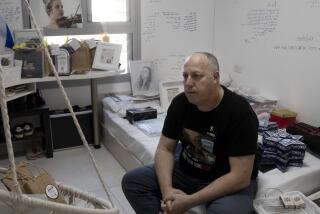Passover’s Personalized Prescription
- Share via
Celebrating an ancient ceremony in a modern way, many Jewish families in Orange County and beyond are personalizing the ritual text read for Passover, which begins at sundown tonight.
Most rituals of the Passover Seder--a meal including symbolic foods such as bitter herbs, matzo, paschal lamb and kosher wine--have been unchanged for centuries. But rabbis say it’s becoming popular for Jewish families to rewrite the traditional Haggada, a book of sacred readings and instructions for the Seder that tells the story of the Jews’ exodus from Egypt.
“I think it’s wonderful to use the Haggada script as a text and then improvise,” said Rabbi Arnold Rachlis of the University Synagogue, a Reconstructionist temple in Irvine, which had more than a hundred examples of personalized Haggadas on display through the week.
The advent of desktop publishing and the Internet has encouraged the practice, said Rachlis, who has collected personalized Haggadas from all over the world, and has seen congregants use the Haggada to write about politics and freedom, including nuclear disarmament and Jewish-Arab relations.
“The Haggada is the most elastic text of any prayer book,” said Rachlis. “But that’s only been the case in the last 100 years. Until then, the traditional text reigned.”
Still, he doesn’t suggest using a specialized Haggada at the Seder in place of the more standard text--rather, as a supplement.
“The best Seders don’t stick to the text,” said Rachlis. “You can even use a pretty mundane Haggada if you have a good leader and exciting people around the table.”
Many families exercise their creativity not by writing their own Haggada, but by choosing one from countless versions in print or on the Internet.
“People want me to pick out a Haggada for them,” said Julie Ghodsi, who owns the Golden Dreidel in Costa Mesa, a Judaica store that sells out of the books every year. “But I say I won’t do that. They are very personal. You will be looking at them the next 20 years. You want to like your Haggada.”
Haggadas range in price from $2.25 to $60 and cater to every branch of Judaism. They range from pamphlets to lavish coffee-table books. Some are geared for children, some are spiritual, others are scholarly. Some have detailed artwork and others are plain text.
Some are extremely creative: in 1996 a Canadian man, Eliezer Segal, rewrote a traditional Haggada in the style of Dr. Seuss and posted it on the Internet. Segal, a Talmudic scholar, published his version last year in a bound book with San Francisco’s No Starch Press.
*
Even if people don’t formally publishing their Haggada, writing text and cutting and pasting images or poetry about liberation or personal transformation is a way of honoring the history of Passover and applying it to contemporary life.
“The real mission of the Seder is to experience and to interact,” said Dr. Barton Blinder of Newport Beach, a member of University Synagogue, who will use a personalized Haggada this year. “Adding something contemporary dealing with liberation often helps with the Seder.”
Although the personalized Haggada may be gaining popularity, its use is not widespread, said Rabbi Mark S. Miller of Temple Bat Yahm in Newport Beach, who said that people often will remain true to the Haggadas they’ve used for years.
“Passover is our oldest festival, and we do things with it, by and large, in old ways,” said Miller.
“I see people pulling out from cupboards their tried and true copies of the Haggada. Often, they are paper-clipped and contain notes from past Seders and have writing in the margins. We have invested something of ourselves in these little books.”
Miller said the dogeared Haggada he uses is 15 years old and very special to him. He said he takes comfort in seeing wine stains scattered on pages and matzo crumbs stuck in the binding.
“Not everything new is better,” said Miller. “Not everything electronic touches the heart.”
*
ANOTHER SEAT AT THE TABLE
Modern times, circumstances are making ‘community Seder’ an accepted practice. B4
More to Read
Sign up for Essential California
The most important California stories and recommendations in your inbox every morning.
You may occasionally receive promotional content from the Los Angeles Times.













